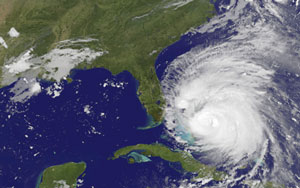 by QBE North America
by QBE North America
As 2021 National Hurricane Preparedness Week kicks off, insurance leader QBE North America released its Predict, Prepare and Protect Hurricane Tips for businesses. Beginning June 1, experts predict a more active season than usual. A recent report by the Colorado State University Tropical Meteorology Project calls for 17 named storms, eight hurricanes and four major hurricanes (115-plus-mph winds), making it a great time to think ahead.
QBE recommends having a disaster response plan in place to help ensure employee and customer safety, minimize property damage, and get business back up and running should a hurricane occur. Businesses should anticipate possible delays in recovery due to economic implications of the pandemic and the challenged construction market.
“Even if you have a tried-and-true plan in place, now is the time to look at it with a fresh mindset,” Paul Isaac, Senior Vice President and Loss Control Leader at QBE North America, said. “Businesses have undergone significant challenges and changes in the last year that may not be adequately addressed in their disaster response plans, and the risks from the pandemic are still present. Our team works closely with claims to help businesses prevent claims from happening and ensure that—when they do—we are right there with you.”
Here are some tips to consider when preparing for hurricane season:
- Employers should be sure to have an up-to-date formal business continuity plan in place, which should be shared with key staff well in advance of a hurricane.
- Gather contacts that are crucial to business operations, such as employees, banks, lawyers, accountants, and suppliers. Save this information in an alternate, accessible off-site location.
- Have a plan in place if there is a loss in power. Make sure generators are on hand and employees know how to use them safely. Companies should be prepared for longer than usual power outages.
- COVID-19 safety is still an issue, especially with the potential for additional on-site workers such as outside responders, contractors, and vendors in the event of storm damage. Businesses should have formalized procedures for protecting all workers during both response and restoration periods.
- Have an up-to-date inventory of what is in your offices and facilities. All products and assets should be documented. Also save a record of current financials and keep in mind physical records can easily get destroyed, so have a backup elsewhere.
- Make sure employees know how to turn off water, gas, and other utilities when necessary, and conduct proper facilities training so multiple people can be called on in a crisis, if needed, especially those in close proximity to the business.
- Stock up on essential items ahead of time and if possible, use a storage facility for storing materials like chainsaws, fuel for generators, plywood, pumps, and other key machinery, as well as survival needs like PPE, disinfectants, water, food items, batteries, first aid kits, and medications.
QBE Risk Solutions offers a variety of tools and tips to help their insureds plan for disasters. Additionally, there are several useful resources to assist with hurricane preparedness planning, including The Ready Business Hurricane Toolkit from FEMA. Businesses should check in with their broker or insurer to discuss any changes to their operations and property, including any employee workplace changes and new or updated equipment. QBE also suggests discussing your current insurance valuations to make sure everything is updated going into the hurricane season.
QBE North America’s Risk Solutions teams are experts in risk and delivering loss prevention and loss protection services. Their focused commitment to service and technical acumen helps customers identify, evaluate, and reduce their potential for losses and business risk. By getting to know their customers, their business operations, priorities, and concerns, they can help deliver the best possible outcomes.

